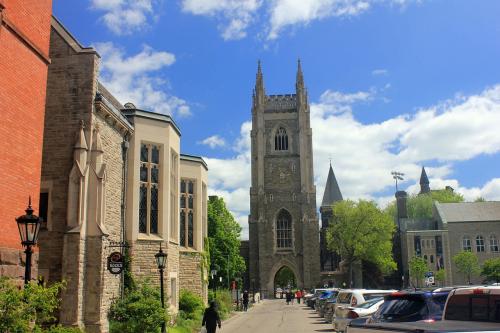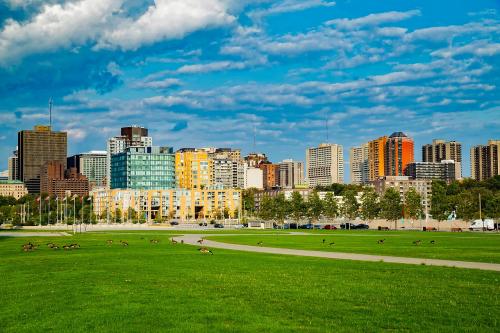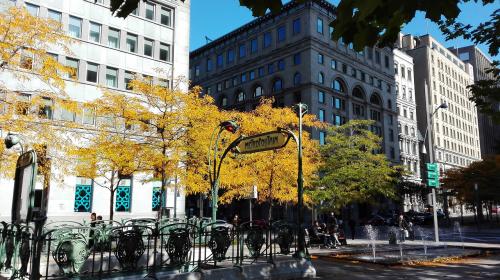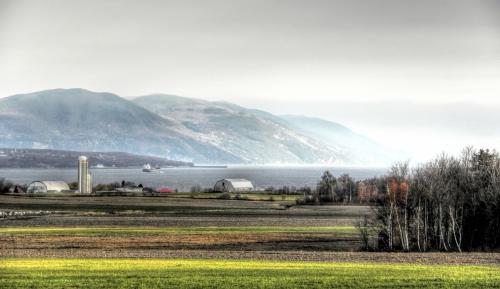Seasons in Canada
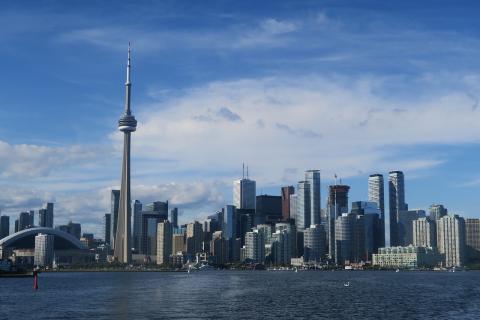
In the world, Canada is the second largest country after Russia. Its vast territory determines the great variety of climate. Also, the temperature differences are strongly affected by the relief features of Canada.
In the north of the country, for example, in a territory close to the Arctic Ocean, the average air temperature in winter is -25 -30 °C (-13°F -22°F), and in summer it hardly exceeds the plus mark. It's a really hard climate! While in the west, where the warm Pacific currents play a decisive role, in winter, the average temperature is four degrees of heat, and in the summer - more than +20 °C (68 °F). And every time of the year it has its own individual climatic features.
Seasons
Contents:
Spring in Canada
Spring is very much like autumn, the temperature of the air and an abundance of rainy days. At this time of year begins the first warming, but in the evenings it’s usually cold, and summer in the country comes rather late - in the second decade of June. The first flowers appear in March, which instantly transforms the country. However, the first leaves are very late - their first appearance is in April or May. True, the spring in Vancouver and Victoria is very different from the spring of other regions of the country – it’s really much warmer.
Features of the Canadian spring - a large number of rains, wind and temperature fluctuations. Stable warm weather comes only towards the end of May. In most of the country, March is considered to be the last month of winter. Primroses cover the landscapes of Canada in April, but the foliage appears rather late - in April-May. In the area of Lake Ontario, spring is almost a couple of "transitional" weeks from winter to summer. In British Columbi, winter lingers longer - here in April, traditionally held extreme skiing competitions.
Climate of the Spring Months
| March Max average t°: +2 °C (36 °F) Min average t°: -7 °C (19 °F) Sundial in the day: 5 hours Snowy/Rainy days: 6 days Precipitation: 74 mm (2.9") |
| April Max average t°: +11 °C (50 °F) Min average t°: 0 °C (32 °F) Sundial in the day: 6 hours Rainy days: 11 days Precipitation: 72 mm (2.8") |
| May Max average t°: +19 °C (66 °F) Min average t°: +8 °C (45 °F) Sundial in the day: 7.5 hours Rainy days: 13 days Precipitation: 79 mm (3.1") |
(Ottawa)
Spring Holidays
Second Monday of March – Commonwealth Day
March-April - Good Friday. Easter and Monday after Easter
The penultimate Monday in May. Celebrations in honor of Queen Victoria
Summer in Canada
Summer comes only in the second half of June, or even closer to the beginning of July. And then, this summer is not in our understanding - the average temperature is only +20 °C (68 °F). There is no strong heat in Canada. Summer can last the longest in the west of the country.
In Toronto, the summer can be very warm. Local Canadian weather forecasters and meteorologists use to indicate the temperature is not real (on a thermometer), and the temperature, called "feels like ...". There are also special terms - humidex in the summer and windchill in the winter. In the summer, the actual +20 °C (68 °F) due to high humidity, wind and other causes can be felt as + 30 °C (86 °F). or even + 35 °C (95 °F).
The warmest is in British Columbia, where in the summer up to + 35 °C (95 °F). In summer the water warms up well in fresh shallow lakes - up to + 25 °C (77 °F). The water temperature in the Pacific and Atlantic Oceans is rarely above + 18 °C (64 °F) even at the end of July.
Climate of the Summer Months
| June Max average t°: +24 °C (73 °F) Min average t°: +13 °C (54 °F) Sundial in the day: 8.5 hours Rainy days: 13 days Precipitation: 85 mm (3.3") |
| July Max average t°: +26.5 °C (79 °F) Min average t°: +15 °C (59 °F) Sundial in the day: 9 hours Rainy days: 12 days Precipitation: 90.6 mm (3.5") |
| August Max average t°: +25 °C (75 °F) Min average t°: +14 °C (57 °F) Sundial in the day: 8 hours Rainy days: 12 days Precipitation: 87 mm (3.4") |
(Ottawa)
Summer Holidays
From June 21 to July 1 – Celebrate Canada with National Aboriginal Day on June 21, Saint-Jean-Baptiste Day on June 24, Canadian Multiculturalism Day on June 27.
July 1 – Canada Day
July 1 to July 7 – Canada History Week
Early August – International Busker Festival
First Monday of August - Civil holiday
Autumn in Canada
Autumn in Canada comes quickly. A sharp cooling can come literally overnight. The weather in the autumn is unstable - often rains, passing in October in wet snow. A dank wind blows. In Toronto, autumn is lingering, warm and very beautiful. Warm days can even be in December.
In November, in Canada, this winter is coming. Snow is falling everywhere except in the southern regions. In the north, the snow cover is generally constant. November is characterized by strong cold winds, a sharp drop in temperature to -15 °C (5 °F).
Climate of the Autumn Months
| September Max average t°: +19.5 °C (66 °F) Min average t°: +9 °C (48 °F) Sundial in the day: 6 hours Rainy days: 14 days Precipitation: 85 mm (3.3") |
| October Max average t°: +12.5 °C (54 °F) Min average t°: +3 °C (37 °F) Sundial in the day: 4.5 hours Rainy days: 14 days Precipitation: 79 mm (3.1") |
| November Max average t°: +5 °C (41 °F) Min average t°: -3 °C (27 °F) Sundial in the day: 3 hours Rainy/Snowy days: 11 days Precipitation: 80 mm (3.1") |
(Ottawa)
Autumn Holidays
The first Monday in September - Labor Day
Second Monday in October - Thanksgiving Day
November 11 - Day of Pardon
Winter in Canada
As a rule, the winter in most of Canada comes into its own in November, when cold winds come, and the subzero temperature stays stable all day. The farther north, the colder the winter: in some areas the air temperature seldom falls below -15 °C (5 °F), which together with the cold wind strongly discourages tourists.
January is considered the coldest month in the north of mainland Canada - here to -35 °C (-31 °F). Winter in February - severe and snowy in most of the territory. For example, in Toronto, the southernmost of the cities with a million inhabitants, to -20 °C (-4 °F). in winter, it’s very snowy and sunny.
Climate of the Winter Months
| December Max average t°: -3 °C (27 °F) Min average t°: -11 °C (12 °F) Sundial in the day: 2.5 hours Snowy days: 5 days Precipitation: 81 mm (3.2") |
| January Max average t°: -6 °C (21 °F) Min average t°: -15 °C (5 °F) Sundial in the day: 3 hours Snowy days: 4 days Precipitation: 70 mm (2.7") |
| February Max average t°: -4 °C (25 °F) Min average t°: -13 °C (9 °F) Sundial in the day: 4.5 hours Snowy days: 3 days Precipitation: 59 mm (2.3") |
(Ottawa)
Winter Holidays
December 11 – The Statue of Westminster anniversary
December 25 – Christmas
December 31 – New Year’s Eve
January 1 – New Year’s Day
January 11 – Sir John A. Macdonald Day
February 15 – National Flag of Canada Day
Third Monday of February - Heritage Day in Canada
 Seasons of the Year
Seasons of the Year 
